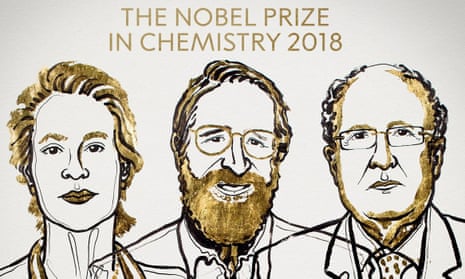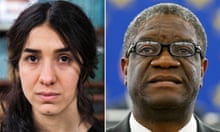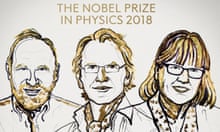Three scientists have won the Nobel prize in chemistry for their work in harnessing evolution to produce new enzymes and antibodies.
British scientist Sir Gregory P Winter and Americans Frances H Arnold and George P Smith will share the 9m Swedish kronor (£770,000) prize, awarded by the Royal Swedish Academy of Sciences.
The winners’ work has led to the development of new fuels and pharmaceuticals by making use of nature’s evolutionary processes themselves, leading to medical and environmental advances.
“This is a field that was waiting for a Nobel prize,” said Paul Dalby, professor of biochemical engineering and biotechnology at University College London.
Half of the prize goes to Arnold, from the California Institute of Technology, for her work on directing the evolution of enzymes – proteins that speed up chemical reactions. In a nutshell, Arnold introduced random genetic mutations into enzymes, and then looked to see what effect the mutations had. She then selected the cases where a particular mutation proved useful – for example allowing the enzyme to work in an environment, such as a solvent, it would otherwise not work in. The process could then be repeated, with further genetic mutations introduced into these selected enzymes.
Arnold’s work has made it possible to cut out the use of many toxic catalysts, providing enzymes for all manner of fields including the development of biofuels and the production of pharmaceuticals.
“People were already using enzymes in industry but only ones they could find in nature that just happened to be good enough – but that was really not many and very problematic to get them to work in industry,” said Dalby. “When [Arnold] came along, now you can adapt your enzyme to work in an industrial environment, instead of in a cell where it is normally used to working.
“Ultimately what it does it take natural evolution’s billion-year process or million-year process down into what is now probably less than a week.”
The other half of the award goes to Winter and Smith for their work on “phage display of peptides and antibodies”. A phage is a virus that can infect bacteria and trick them into reproducing it. Smith, of the University of Missouri, found it was possible to tinker with the genetic material of a phage to change the molecules stuck on its outside.
He realised this could be handy: for example, if it were not known what protein a particular gene gave rise to, the gene could be put into a phage and the mystery protein would appear on the surface and be identified. It also meant scientists could introduce a whole host of unknown genes to phages and see if any of them gave rise to proteins they already knew about, allowing them to work out which genes were responsible for which proteins.
The approach has also opened the door for scientists to engineer phages bearing specific proteins in order to explore how these might interact with particular targets. Winter’s work focused on genetically tweaking phages so that they produced antibodies on their surface – more specifically, the part of an antibody that attaches to other molecules. This meant he could screen them to find antibodies with the best interactions with other molecules or even cells.
He then went further, introducing mutations to develop the antibodies to boost these interactions, developing antibodies that could be used to target very particular cells.
The result has been new drugs that have transformed medicine, offering therapies for diseases ranging from cancer to autoimmune conditions. One is adalimumab, an antibody-based drug used to treat rheumatoid arthritis, psoriasis and inflammatory bowel disease.
“Nearly every modern therapy now is an antibody, based on using things like phage display,” said Dalby. “It is utterly pioneering, and if George Smith hadn’t done the phage display in the first place it would never have happened.”
In an interview in 2016, Winter confessed to his first cancer patient that he had no idea if the antibody therapy would work. She said: “It only has to buy me a couple of months … my husband is dying and I want to be with him when he dies.” In fact, the therapy was hugely successful and “a massive tumour was blown away”, Winter said. His win brings the total number of Nobel prizes won by researchers at the Laboratory of Molecular Biology in Cambridge to 12.
Arnold is only the fifth woman to be awarded the prize for chemistry. Upon being inducted into the US National Inventors Hall of Fame in 2004, she said: “25 years ago, it was considered the lunatic fringe. Scientists didn’t do that. Gentlemen didn’t do that. But since I’m an engineer and not a gentleman, I had no problem with that.”
Smith paid tribute to his predecessors in the field. “Very few research breakthroughs are novel,” he told the Associated Press. “Virtually all of them build on what went on before. It’s happenstance. That was certainly the case with my work. Mine was an idea in a line of research that built very naturally on the lines of research that went before.”
Winter said the phone call from the committee was not an immediate success, with a Swedish voice asking him to hold the line for a very important announcement, before he found himself cut off. At first, he said, he wondered if it was his bank calling.
“When I got the call I was recovering from a college feast. I had had an aspirin, I had had a coffee and it came as a bit of a shock and I felt a bit numb for a while, wondering if this was real,” he said. “It is like you are in a slightly different universe.”
Winter added that he was going to start spending his winnings by throwing a celebration at the lab: “They have already told me the champagne bill will be £2,793 and can we have your credit card number please?” On Monday, James Allison and Tasuku Honjo won the 2018 medicine Nobel for their work on harnessing the immune system to combat cancer, and on Tuesday the physics prize was shared between Arthur Ashkin, Gérard Mourou and Donna Strickland for their work on laser physics.
The peace prize winner will be announced on Friday, followed by economics on Monday. The literature award is not being given this year after a scandal that resulted in a rape conviction earlier this week.









